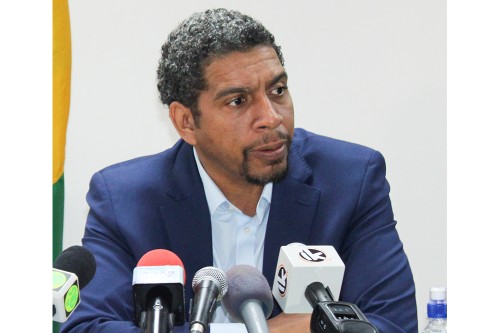SVG Minister Gonsalves: 2022 UN Climate Summit Was "at Best, a Mirage in the Desert"
KINGSTOWN, St. Vincent – The 2022 United Nations Climate Change Conference (COP27) held in Egypt last November was “at best, a mirage in the desert,” says Minister of Finance Camillo Gonsalves.
 Minister of Finance Camillo GonsalvesHe said in his Budget Address this week that the global climate talks confirmed that “the slow halting steps of possible diplomatic advances have not kept up with the headlong sprint of major polluters towards environmental calamity”.
Minister of Finance Camillo GonsalvesHe said in his Budget Address this week that the global climate talks confirmed that “the slow halting steps of possible diplomatic advances have not kept up with the headlong sprint of major polluters towards environmental calamity”.
This is the case even as the countries worst affected by climate change, including St. Vincent and the Grenadines (SVG), continue to have to allocate a large chunk of their meagre resources to respond to climate change.
“The battle against climate change is a constant and increasingly lonely rearguard action against the selfish, short-sighted actions of major emitters who believe that it’s okay for small island developing states to pay the price of their rich countries’ voracious appetites for consumption and pollution,” Gonsalves told Parliament.
“It is capitalism run amok,” he said, adding that Kingstown “will continue to fight globally and here on the ground diplomatically, legally and infrastructurally to ensure our survival against the menace of climate change”.
The minister said that the 2023 fiscal package continues that battle. This year, EC$80.3 million (One EC dollar = US$0.37) of the EC$1.4 billion budget that the finance minister is asking lawmakers to approve has been allocated to environmental protection, a marginal increase over the 2021 figure.
He said that at COP 27, countries announced with great fanfare the creation of a loss and damage fund through which major polluters would help developing countries to recover from the damage and economic losses wreaked from ongoing climate change impacts.
“You had to read the fine print to learn that although rich nations agreed to create a loss and damage fund, no one agreed to put any actual money in the fund,” Gonsalves said.
“It was reminiscent of rich countries’ still unfulfilled 53-year-old promise to spend 0.7 per cent of their gross national income on official development assistance by the year 1975 or the 2009 commitment to mobilize $100 billion a year to address climate mitigation and adaptation needs of developing countries, or indeed, the solemn 2016 pledge to ‘pursue efforts to limit the temperature increases to 1.5 degrees Celsius above pre-industrial levels, recognizing that this would significantly reduce the risks and impacts of climate change’,” Gonsalves told Parliament.
He said that none of those “headline-grabbing global promises” were anywhere close to fulfilment.
“At this rate, the diplomatic operation will be deemed successful long after the environmental patient is already dead,” he said.
“St. Vincent and the Grenadines cannot wait. Climate change threatens our very existence. As the waters and temperatures rise and as the hurricanes intensify and as the droughts become more frequent and the disasters become the rule rather than the exception, our situation becomes ever more precarious yet we must fight on.”
The finance minister said that in the face of long odds and with limited means, budget 2023 continues to invest in adaptation and environmental protection.
He said that while the fiscal package allocate EC$80.3 million this year under the functional classification of Environmental Protection, in reality, millions more are allocated to this, especially in infrastructure investments, “where almost every single road, bridge or building is now designed and built or relocated to take account of the future impacts of climate damage”.


